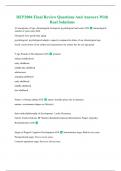Exam (elaborations)
DEP2004 Final Review Questions And Answers With Real Solutions
- Course
- Institution
DEP2004 Final Review Questions And Answers With Real Solutions 4 Conceptions of Age- chronological, biological, psychological and social ANS chronological: number of years since birth biological: how quick body aging psychological: psychological adaptive capacity compared to others of our chron...
[Show more]



